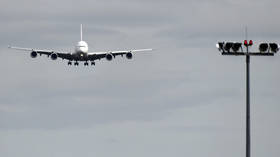Tourist hub Bali swept up in Indonesia’s harsh lockdown despite 71% vaccination rate, as country's infections spike
Hundreds of roadblocks and checkpoints have been erected across Indonesia as authorities attempt to enforce a harsh lockdown aimed at curbing the spread of Covid-19, which has surged in the country in recent weeks.
“We are setting up [patrols] in 21 locations where typically there are crowds,” Istiono, the head of Indonesia’s national traffic police, who goes by only one name, told reporters on Friday night.
Where there are street stalls and cafes, we will close those streets, maybe from around 6pm until 4am.
The beefed-up patrols and roadblocks will focus on the islands of Java – the country’s most populous, where the national capital of Jakarta is located – as well as Bali, a common tourist destination. Some 21,000 police officers and soldiers will enforce the new restrictions, according to a police spokesman cited by Reuters. They will also administer random coronavirus tests at checkpoints.
Beaches closed in Canggu, Bali with latest lockdown. Feeling very bad for the people of Bali who seem to be getting vaccinated and have already suffered so much. Looking for a Plan B to salvage the family summer holiday. #canggu#Balipic.twitter.com/lyOxEvvW4b
— Noah Bohnen (@NoahBohnen) July 3, 2021
The move comes soon after President Joko Widodo declared a new lockdown earlier on Friday, set to last into late July, though it could be extended. The order requires all “non-essential” businesses to shut their doors, while Java- and Bali-based students will have to learn from home if possible. Parks, malls, indoor restaurants and places of worship, among other public spaces, have also been closed.
Some exceptions were made for those who are both vaccinated and test negative for the virus, as they were permitted to travel long-distance in the affected areas.
Indonesia is currently facing one of Asia’s worst coronavirus outbreaks, tallying more than 20,000 cases each day in recent weeks – many believed linked to the Delta variant first observed in India – and that only accounts for those verified by testing. The country has smashed its own daily infection record for the last 12 days, according to Reuters, reporting 25,830 cases on Friday, as well as a high of 539 fatalities.
While a national vaccination drive is underway, largely relying on a shot developed by China’s SinoVac, only about 5% of Indonesia’s 260 million-strong population has been fully immunized against the virus, according to figures compiled by Our World in Data. That amounts to about 13.7 million people.
Given Bali's popularity with tourists and its status as an economic hub, the immunization efforts have focused heavily on the island, where around 71% of residents have been vaccinated so far. Amid a recent spike in cases – seeing about 200 per day – the island remains closed to international tourism, including for vaccinated sightseers, allowing only Indonesian nationals and those with special permits to travel there. It boasts a population of some 4.3 million.
Since the pandemic first emerged in late 2019, Indonesia has seen some 2.2 million cases and nearly 60,000 deaths.
Also on rt.com Indonesia ‘on edge of catastrophe’ as coronavirus Delta variant floods hospitals – Red CrossThink your friends would be interested? Share this story!













